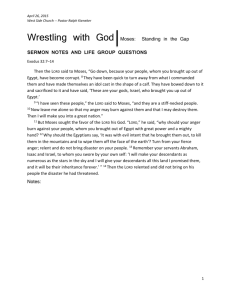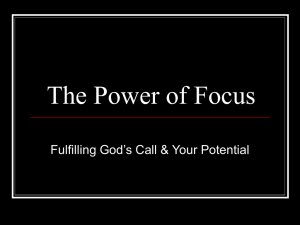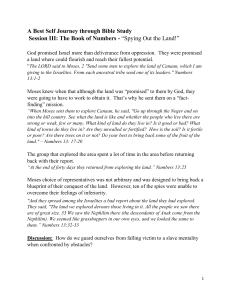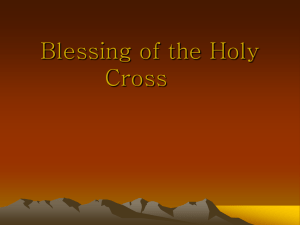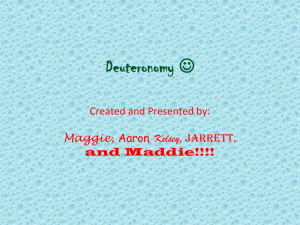notes - Mayfield Salisbury Parish Church
advertisement
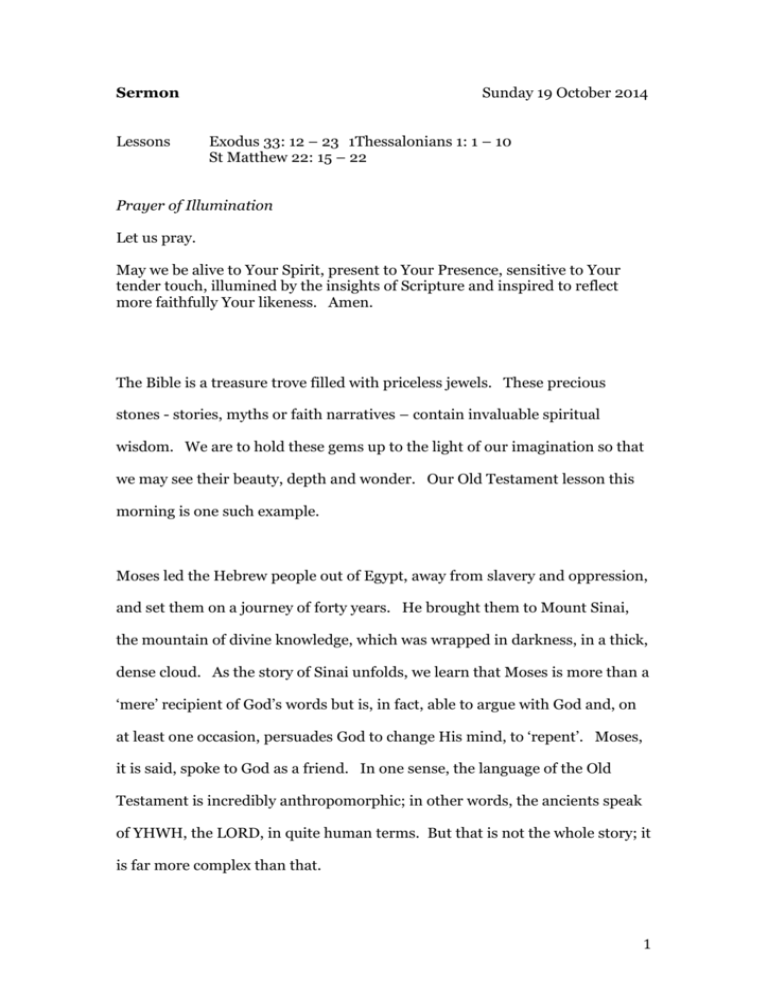
Sermon Lessons Sunday 19 October 2014 Exodus 33: 12 – 23 1Thessalonians 1: 1 – 10 St Matthew 22: 15 – 22 Prayer of Illumination Let us pray. May we be alive to Your Spirit, present to Your Presence, sensitive to Your tender touch, illumined by the insights of Scripture and inspired to reflect more faithfully Your likeness. Amen. The Bible is a treasure trove filled with priceless jewels. These precious stones - stories, myths or faith narratives – contain invaluable spiritual wisdom. We are to hold these gems up to the light of our imagination so that we may see their beauty, depth and wonder. Our Old Testament lesson this morning is one such example. Moses led the Hebrew people out of Egypt, away from slavery and oppression, and set them on a journey of forty years. He brought them to Mount Sinai, the mountain of divine knowledge, which was wrapped in darkness, in a thick, dense cloud. As the story of Sinai unfolds, we learn that Moses is more than a ‘mere’ recipient of God’s words but is, in fact, able to argue with God and, on at least one occasion, persuades God to change His mind, to ‘repent’. Moses, it is said, spoke to God as a friend. In one sense, the language of the Old Testament is incredibly anthropomorphic; in other words, the ancients speak of YHWH, the LORD, in quite human terms. But that is not the whole story; it is far more complex than that. 1 In one encounter, in one dialogue which Moses had with God, the great lawgiver asked if he could see the face of God. Moses craves ever closer communion with the Divine. God the LORD replied, ‘My presence will go with you, and I will give you rest.’ Moses asked, ‘Show me your glory, I pray.’ God’s glory or dazzling light, is the Shekinah, the Divine Presence, the Holy Spirit. God replied: I will make all my goodness pass before you, and I will proclaim before you the name, the LORD (YHWH); and I will be gracious to whom I will be gracious, and will show mercy on whom I will show mercy. But you cannot see my face; for no one shall see me and live. God then told Moses to stand on a rock and, while God’s glory passed by, God would put Moses in a cleft of the rock, an opening, a hallow, and God said, ‘I will cover you with my hand until I have passed by; then I will take away my hand, and you shall see my back; but my face shall not be seen.’ Read literally about hands and hallows, God’s voice, face and back, this story is nonsense and not of this world, this universe. Yet, with meditative, imaginative engagement, what do we learn? A central feature of Mount Sinai in Scripture is that is it shrouded in thick, dense cloud, impenetrably dark. This poetry of the ancients tells us that God is always beyond human sight and comprehension; God is always hidden in the darkness behind the dazzling light. The poetry of hiddenness is repeated when Moses returns to the camp and entered the Tent of the LORD’s Presence. The Tent, it is said, is filled with thick, dense cloud. 2 Back on the mountain, Moses stood on a rock. When the LORD passed by the LORD put Moses in a hallow and covered him with His hand. Moses craved complete intimacy with the Holy, and pleaded, ‘Show me your glory, I pray’. In other words, on the mountain, already in darkness, the most mystical, personal, intimate encounter or experience Moses had of God was in a place of the deepest darkness: God’s hand covered him in the hallow. It was there, in a place of stillness when he was completely blind, without the faintest shaft of light, that Moses felt the presence of the Presence. The world was shut out; there was nothing. No distracting images of the world and, perhaps more importantly, no distracting images of God. This is not a nonsense story but an account of the most profound spirituality. It is often in our most vulnerable moments, our times of complete failure and brokenness, that we God is most real to us. The fourth century mystic, Gregory of Nyssa, said that all language of God is superficial. He said, ‘The one who becomes aware of God’s mysteriousness has learned more than the articulate theologian.’ God is to be perceived inwardly. As we approach our Gospel lesson this morning, the story of Jesus and paying taxes to Caesar, our starting point is the incomprehensibility of the Divine. We are fortunate: we live in a scientific age in which we know so much more detail about the universe than the ancients did. Astronomers tell us that our universe contains between 100 and 200 billion galaxies. The numbers are quite staggering. Through the telescope looking at the stars and the microscope looking at the micro-levels of life, we are filled with amazement at the dimensions of life. It is not for nothing that the ancients and the mystics 3 speak of the utter incomprehensibility of God. Credal statements and doctrinal definitions must make God smile! In our Gospel lesson, Jesus faced a question about paying tax to Caesar. The Pharisees and the Herodians, members of Herod’s party, tried to entrap Him. At a very human level, the Pharisees and their friends represent the deceit, cunning, ego and malice that is so prevalent in human society, not least at the top of society. Lauding Him with faint praise, they ask, ‘Is it lawful to pay taxes to the emperor, or not?’ If He said ‘Yes’, He ran the risk of offending the Jewish faith because the coin which was used to pay the empire’s poll tax bore the image of Caesar. It read, ‘Tiberius Caesar, son of divine Augustus.’ Tiberius was ‘the’ son of God. The reverse side read ‘Pontifex maximus’: he was also the high priest. If Jesus said ‘No’, it might be seen as inviting revolt and the last bloody revolt was only just over twenty years earlier. Nothing to do with the separation of the sacred from the secular, this story has everything to do with the claim of God on our life. There may be something quite ironic in Jesus’ reply: give to this little man his coin, pay your tax to uphold the state, law and order, but give to God, the Deity who is in everything, penetrating everything, embracing everything, the place, priority, prominence and honour God deserves. For Jesus, there is simply no comparison between the things of this world, no matter what great claims are made, and the incomprehensible Mystery at the centre of all life, all 100 or so billion galaxies. The more we centre ourselves on God the less we are attracted to the treasures of the world. 4 St Paul praised the people of Thessalonica for turning away from this world’s idols and turning to God. Filled with the Holy Spirit, the Shekinah, their life was marked by their hope in God. They are said to wait on God. Their faith was the context of their life. There is enormous confidence to be had by letting the Holy Spirit, the Shekinah, penetrate the soul. We live in troubled times: with the rise of atheism, we can easily become depressed. But the evidence of the Bible is that empires, political and intellectual, rise and fall. In the Old Testament, Assyria was great: Assyria fell. Babylon was great: Babylon fell. Looking at Caesar’s coin, Jesus knew that. After the Second World War, Marxism was the fashion in many parts of the world but, in the 21st century, Christianity’s expansion is most marked in the former Soviet Union and the Republic of China. Atheism fits well into our society’s hedonism: the goal of life, the pursuit of individual happiness, makes few moral demands on us. Atheism is perfect in our cultural climate. The peace we experience in the cleft of the rock is the peace of Christ, the energy of Christ. If I despair of the churches, not least our own, the Church of Scotland, it is that we are afraid to say this. We are so busy trying to be relevant, show our worth to society and, at times, ingratiate ourselves to political power. By focusing on the material and expressing ourselves in material terms, we have become secular. In terms of theology, the best rational arguments in favour of Christianity do not convince. What the Church has to offer the world is helping people to a lived sense of God’s Presence in the world, through its complexity, mess and muddle. The late Roland Walls of Roslyn said that, at its best, in prayer we enter heaven. What an incredible thought! Each day, in moments of quiet and stillness, perhaps 5 fleetingly, we can sit in the cleft of the rock, in our aloneness, and moving beyond words and images, into our own vulnerability, we can enter heaven….each day! Amen. 6

